The government of the Dominican Republic told one of the nation’s largest newspapers on Thursday that the United Nations had not consulted it to create a “humanitarian air bridge” to send supplies and relief workers into Haiti.
The apparent absence of communication between the U.N. and the Dominican Republic signals a growing rift in the global agency’s relationship with the Caribbean government following Santo Domingo dismissing requests from U.N. officials to cease mass deportations of Haitians illegally present in the country. In response to calls not to deport the illegal immigrants, Dominican officials insisted that not allowing them to remain was a “national security” issue for the country and suggested the U.N. demand more action from countries that do not share a land border with Haiti.
Haiti has been mired in gang-fueled violence for decades, but its government has been in a state of unprecedented disarray since the assassination of President Jovenel Moïse in 2021. Haiti has not had a president since, leaving unelected Prime Minister Ariel Henry with no identifiable public support and few resources to contain gang violence. Henry left the country in early March to travel to Kenya, where he asked President William Ruto to provide police officers for a U.N.-approved Multinational Security Support (MSS) mission. Upon his departure, armed militias led by notorious gang boss Jimmy “Barbecue” Cherizier attacked prisons, freeing as many as 4,000 criminals, and surrounded Port-au-Prince’s airport, making it impossible for Henry to return.
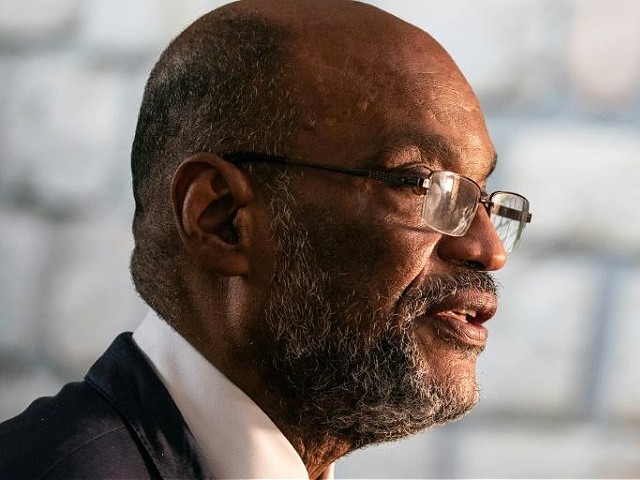
Ariel Henry (VALERIE BAERISWYL/AFP via Getty Images)
Henry is currently stranded in Puerto Rico, leaving the gangs in charge of the country. He announced on Monday that he would resign, but only after the establishment of a “Transitional Presidential Council,” whose creation has become a major point of contention in the country. Multiple Haitian power brokers — and “Barbecue” — oppose the plan, the latter threatening to kill the children of anyone supporting it.
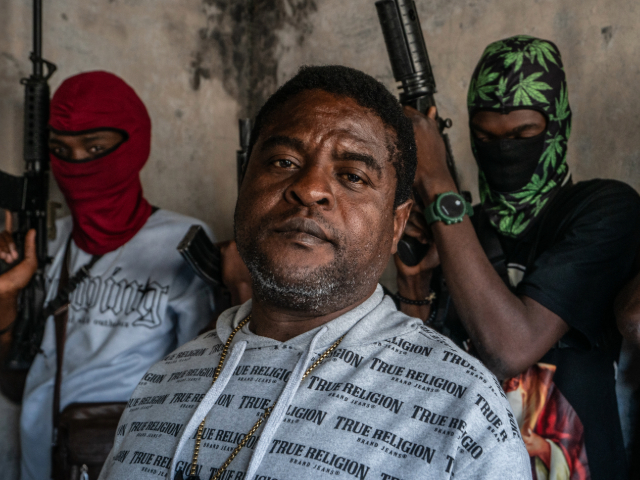
Gang leader Jimmy “Barbecue” Cherizier with G-9 federation gang members in the Delmas 3 area on February 22, 2024, in Port-au-Prince, Haiti. (Giles Clarke/Getty Images)
The U.N. announced a plan on Wednesday to address the ongoing lawlessness in Haiti by creating the “air bridge,” flying staffers, food, and medicine into the country and evacuating non-emergency personnel. The U.N. Integrated Office in Haiti (BINUH) issued a statement that made the plan appear to be a given fact, promising the “air corridor will enable the transport of aid and ensure the safe relocation of staff both in and out of the country.”
The statement read:
The UN [in Haiti] is establishing an airbridge between Haiti and the Dominican Republic. The airbridge will ensure the seamless delivery of humanitarian aid and support services to Haiti, and facilitate the movement of our personnel in and out of the country.
“The air bridge announced on Wednesday between Haiti and the Dominican Republic to send humanitarian aid to the Haitian people, victims of a grave crisis, should be operative as soon as possible,” Stéphane Dujarric, a spokesman for U.N. Secretary-General Antonio Guterres, told reporters on Thursday.
Dujarric demanded “at least $10 million” in international funding for the effort, lamenting, “We’re not getting the money we need for that mission to be put together.”
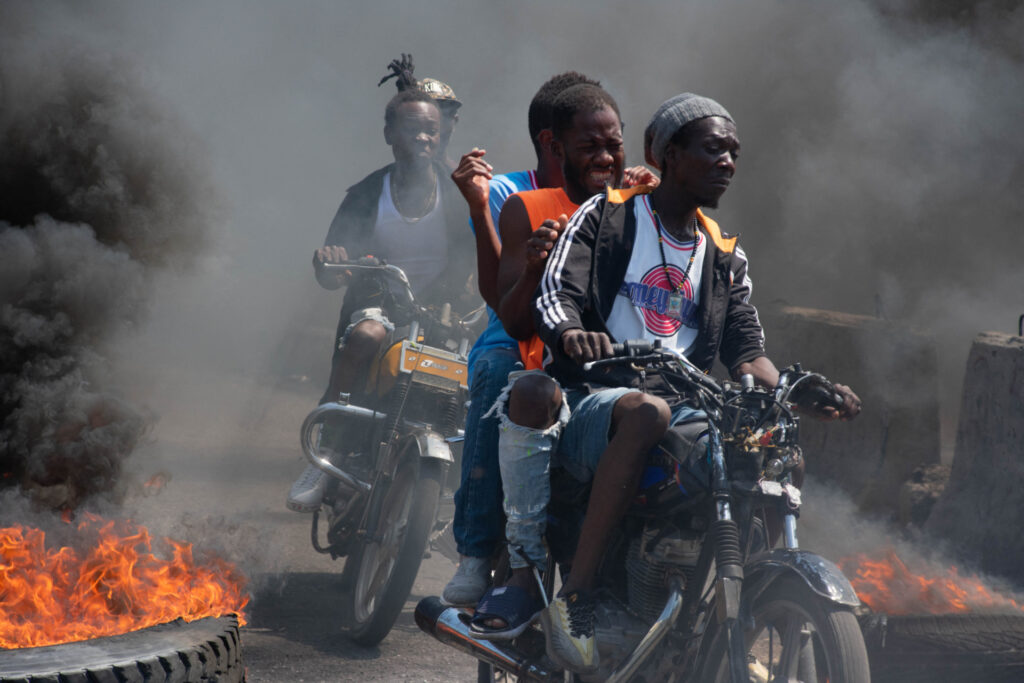
Men on motorcycles drive past burning tires during a demonstration following the resignation of Prime Minister Ariel Henry in Port-au-Prince, Haiti, on March 12, 2024. (CLARENS SIFFROY/AFP via Getty Images)
Listín Diario, one of the largest newspapers in the Dominican Republic, reached out to the government of President Luis Abinader to inquire about Santo Domingo’s role in the establishment of the “air bridge.” Presidential spokesman Homero Figueroa asserted that the government did not have one.
“The U.N. has not solicited a humanitarian bridge from the Dominican Republic,” Figueroa said, in a message Listín described as “curt.” The report did not explain how it would be possible for the United Nations to establish its “air bridge” without collaborating with the Dominican government.
Dujarric had already irritated Dominican leaders with a statement discouraging the deportation of Haitians into the country illegally.
“We don’t want mass or forced deportations of people to a country that is clearly not safe,” Dujarric emphasized.
The nation’s foreign minister, Roberto Álvarez, issued a lengthy statement rejecting the U.N.’s urging not to deport the individuals in question, citing the “national security” of the country.
“We respect Stéphane Dujarric’s opinion, but we have an established policy that for reasons of national interest we are returning to Haiti all those people who are illegally in Dominican territory according to our legislation,” Álvarez said.
“The situation in Haiti is a national security issue for the Dominican Republic and that must be kept in mind,” the foreign minister continued. “Therefore, what the spokesperson of the General Secretariat, Stéphane Dujarric, may ask of other countries is understandable, of other countries that are not a neighboring country of Haiti’s.”
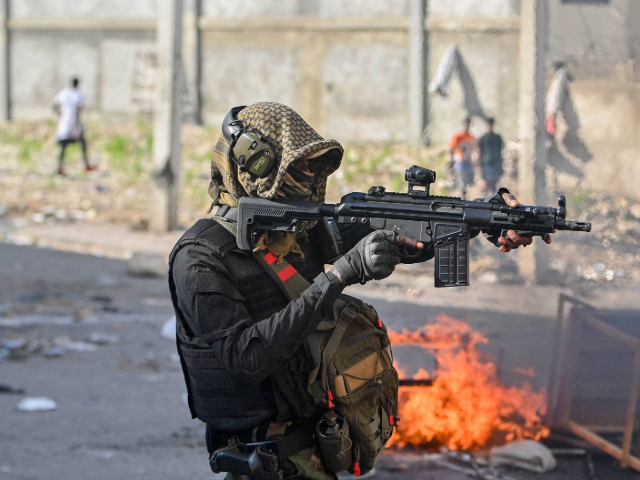
A policeman points a gun at protesters during a demonstration calling for the resignation of Prime Minister Ariel Henry in Port-au-Prince, Haiti, on February 7, 2024. (RICHARD PIERRIN/AFP via Getty Images)
President Luis Abinader has made combatting illegal immigration a core policy of his government, beginning the construction of a border wall with Haiti in February 2022. Haiti and the Dominican Republic share the island of Hispaniola. Abinader’s administration announced that the wall would span about 250 miles — half the border.
Construction continues not just on the wall, but on perimeter fencing in areas where the government has yet to plan for a more solid barrier. Locals on the Haitian border told Listín Diario on Wednesday that they were grateful for barriers preventing criminal activity from entering the country.
“We used to live like lawless goats here because there was nothing that signaled [where the border is] and now we have the wall that also sends a message to everyone,” Héctor Quilderes Taveras, a local businessman, told Listín.
The head of the merchants’ federation in Dajabón, a Dominican border municipality, similarly signaled that his community supported erecting stronger barriers with Haiti.
“We support this initiative of the construction of the border gate because this creates a certain order with respect to not just commerce but also other things that surface when things were open-sky [borderless],” the man, Freddy Morrillo, told the newspaper.
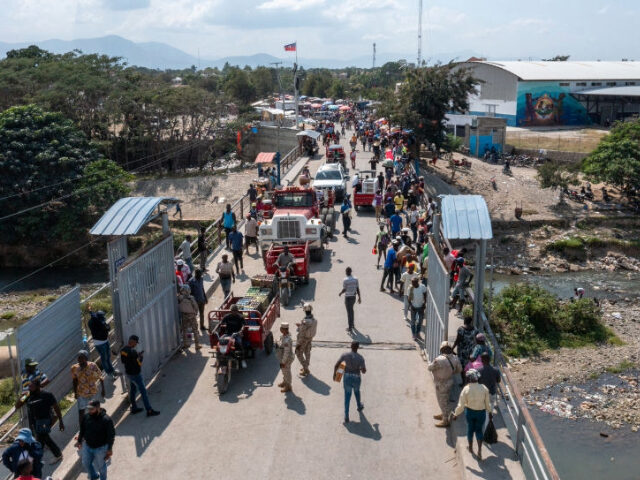
COMMENTS
Please let us know if you're having issues with commenting.